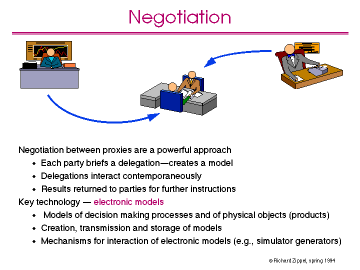
Back to the previous slide, on to the next slide or up to the communications overview
Years ago, when communications were limited, complex business and diplomatic agreements could be reached by laboriously exchanging letters. However, the alternative approach of sending emissaries proved more useful. Although, technology has provided us with telexes, faxes and electronic mail which dramatically improves the time required to transmit information over letters, we have not returned to direct negotiations. Instead the original non-contemporaneous solution is still used -- negotiations between proxy models.
The presidents of the different organizations do not get together and negotiate. This would not be practical or an efficient use of their time. Instead, each party selects a delegationthat is briefed on the organization’s positions, resources and needs—the delegations are (inexact) models of their respective organizations. The delegations meet and exchange positions and ideas based on these models and try to come to an agreement that meets the goals of their organizations without exceeding the acceptable costs. The actual negotiating positions are, of course, kept secret.
At the end of each negotiating round, the delegations return to their organizations with the proposed (partial) agreement and seek further guidance for refining the agreement. The final decision on the acceptability of the agreement rests in the hands of the organizations’ leaders.
This approach of negotiating models continues to be of use, and can be applied to a wide variety of different examples. The key technology required to make this approach work in an electronically connected world is the creation of sealed behavioral models of negotiating positions and physical objects (the products that are being offered for sale) that can be transmitted over the electronic networks. In addition, mechanisms need to be created to allow these models to interact. That is, create simulations, at various levels of detail, from the electronic models.
Richard Zippel